- Home
- Scott Mariani
The Tunnel
The Tunnel Read online
This ebook short story is entirely a work of fiction. The names, characters and incidents portrayed therein are creations of the author’s imagination. Any resemblance to actual persons, living or dead, is purely coincidental.
Published by Claymore Publishing
Copyright © Scott Mariani 2015
www.scottmariani.com
Scott Mariani asserts the moral right to be identified as the author of this work.
ISBN: 978-0-9569226-8-7
Artwork design and layout by Damonza
www.damonza.com
All rights reserved. This ebook is copyright material and must not be copied, reproduced, transferred, distributed, leased, licensed or publicly performed or used in any way without the prior permission of the copyright holder.
Table of Contents
CHAPTER 1
CHAPTER 2
CHAPTER 3
CHAPTER 4
CHAPTER 5
1
Somewhere in the remote Highlands of Scotland
Christmas Eve, 2004
Just before the last crimson-purple glow of the falling sun dipped behind the mountains and nightfall spread over the glen, the stag appeared suddenly, silently, at the top of the rise. He stood there for a long moment, as still and poised as a statue, his head held nobly aloft and his magnificent twelve-point rack of antlers silhouetted against the streaks of fire in the sky.
The stag surveyed the wintry, bleak wilderness that stretched for miles in all directions. Two centuries since the last Scottish wolf had been hunted to extinction, this was his sanctuary, his only remaining natural predator being man. He was an old male, veteran of countless rutting conquests and fights, and age and experience had made him wily enough to avoid the few human beings who ventured up here into the wilderness. Confident that all was well, the stag gave a snort or two and moved on, in his unhurried way. He paused to nibble at a shrub, then disappeared over the next rise and was gone.
The man concealed in the gorse bushes watched the animal stride away over the brow of the hill. The old monarch of the glen had come within eight feet of him without sensing a human presence.
Ben Hope stood up and slowly emerged from his cover, careful not to leave a single broken twig as evidence he’d ever been here. For the last twenty minutes, the thicket of gorse had served him as an observation point from which he, too, had been surveying the unspoilt panorama that seemed to go on forever in all directions.
Unlike the deer, Ben Hope wasn’t scanning for predators. Because he was the predator.
But his hunt wasn’t for wild quarry. He was here today to stalk a very different and far more dangerous kind of prey. His prey was a man. A man he’d known for a long, long time, whom he’d thought he could count as a loyal comrade, if not a friend. A man who was one of the remote few he’d encountered in his life whom he considered possibly more accomplished in their chosen profession, more skilled, hence more lethal, than Ben himself.
Whether that was still true, time would soon tell.
*
A chill wind was blowing from the mountains as darkness fell, numbing his face. The icy rain that had lashed the glen all day long had finally cleared, and the moon was bright, dimmed every now and then by dull clouds that threatened to fill the sky and, if the conditions changed and the wind dropped, could signal possible heavy snowfall over the next few hours.
Ben frowned up at the sky and hoped that wouldn’t happen. It wasn’t the cold that concerned him, or the possibility of getting stranded out here in the middle of nowhere. Rather, it was the near-impossible challenge of moving over snowy terrain without leaving tracks. If tonight’s operation went as he thought – and feared – it might, then the repercussions would be swift, harsh and rigorous. The kind of men who would be sent out to scour every inch of ground for miles to search for evidence wouldn’t be easy to deceive. They’d be professional trackers with years of experience and exactly the same level of training as his own. Which was the highest level available anywhere on the planet. Ben was all too aware of the resources the opposition could unleash to catch him.
He tightened up the straps of his pack and kept moving. Night came fast this far north and so late in the year. He welcomed the darkness. It was his element and he felt protected by it.
He’d long ago learned to navigate by the stars, but in these conditions of alternating cloud and bright moonlight he opted for the handheld GPS tracking and digital compass unit he carried on his belt. To avoid the single road that cut through the valley, he had selected a route that would fishhook around the objective for about four miles and take him onto high ground to the northeast, where he would mount his final OP before moving in. Route selection was the first requirement of tactical movement. Night work was slower, but safer. You avoided pre-existing tracks, footpaths and human habitation at all cost. You made maximum use of natural cover, crossed open ground at its narrowest point, and then only after a careful scrutiny of the terrain. Hills were to be contoured some two-thirds up their slopes, in order to keep to the high ground wherever possible and at the same time minimise the risk of being silhouetted against the sky, should the cloud cover suddenly break.
These things had all been instilled so deeply in him that they came as naturally as walking and breathing. But never once, not even in his most sombre dreams, had he ever thought he’d one day find himself using such skills against the very same people who had taught them to him.
He was dressed in black from head to foot. Below the hem of his beanie hat, his face was camouflaged with burnt cork. When the clouds passed over the moon he was nothing more than a moving patch of black on black, invisible even to a fox. From time to time, when the cloud cover parted and the landscape glowed with the moonlight, he instinctively paused to check his background and ensure that he wasn’t outlined against the sky or casting a long, moving shadow that would be a giveaway to any potential spotter.
Only by constant vigilance was it possible to move totally undetected, and it was a skill at which he’d excelled since the earliest days of his SAS training. Nobody could see, hear or even smell him coming – literally. He’d left the cigarettes untouched for several days, so that the scent of tobacco smoke and aromatic tar couldn’t be carried on the wind to be picked up by a sensitive nose as much as quarter of a mile away. Before setting out he’d washed himself carefully with a neutral and odourless soap, for the same reason. Overcaution wasn’t in the SAS vocabulary. On covert missions into hostile enemy territory, where the smallest mistake could spell fatal disaster, even spicy foods had to be avoided for up to a week beforehand, to avoid telltale scents leaking out in your sweat.
And a mission into enemy territory was exactly what Ben was engaged in at this moment. A mission sanctioned, planned and carried out by him alone, and for which he would bear the sole responsibility if he failed, or was taken captive, or was killed. Any of which, when going up against an opponent like this one, was a very possible outcome.
With that in mind, he’d equipped himself as thoroughly as if he were on an official military operation. As carefully, too. The van in which he’d driven up through Scotland could never be traced to his name. The lightweight infra-red binoculars with laser rangefinder were the same model he’d carried on active duty. So were the silenced Browning nine-millimetre semiautomatic pistol strapped to his right thigh and the Heckler & Koch MP5 submachine gun with integral sound suppressor slung around his shoulder. Needless to say, he’d acquired the hardware without leaving any trails. The firepower was no kind of an overcaution, either. Ben would have been surprised if his target wasn’t similarly armed. Whatever happened tonight, if blood was spilled it would be done swiftly and quietly.
His preparations hadn’t stopped there. The soles of his boots were cover
ed with rough, grippy leather pads that he had taped into place over the rubber to avoid leaving tread marks. The CTT combat tracker team would be able to tell from even the faintest partial print exactly what kind of boot the intruder had been wearing, and he wished to give them not even the smallest shred of evidence. For the same reason, the leather pads would prevent mud from getting into the treads, which might easily get scuffed against a rock and leave a telltale smear. SAS soldiers were taught that nothing could be allowed to leave a trace of their passing whilst on patrol behind enemy lines. If you had to piss, you did it in a special sealed container. If you had to do the other, you carried it with you in a bag inside your pack for the duration of the mission.
Another piece of equipment he’d fielded was a decidedly non-standard item. During the Malayan jungle campaign in the 1950s, one of the tricks employed by Communist guerrillas to evade British Army Ghurkha trackers had been to shoot a poor unsuspecting tiger and use one or more of its severed paws to print pugmarks over their own tracks in soft ground. Ben had obtained the deer’s foot a few days earlier, and was using it in the same painstaking fashion, step by step, to obliterate any tracks he left in the dirt. A true deer spoor couldn’t be replicated exactly that way, but by the time the trackers came, the prints would have been weathered enough by morning dew, rain and even sunlight to confuse them.
Hours passed. Inch by inch, mile by mile, pausing frequently to look and listen, he worked his way around the objective until, eventually, he reached the north-east point overlooking it from the high ground. There he used the cover of thick bushes to lie flat and scan the surrounding area with his night-vision binoculars, examining it in overlapping strips to study every detail.
The old stone house was all in darkness, except for a single light in a window on the first floor. It was a large and imposing property, all the more so for its remoteness, standing completely alone in the midst of the wilderness.
Based on Ben’s knowledge of his target, he didn’t expect the man to have company. That of the female variety, at any rate, could be ruled out with almost complete certainty. He was vociferous in his staunch dislike of women generally, partially resulting from, and partially the cause of, the unhappy endings of his four marriages. As for male company, he had no close friends of his own sex either. He was famously independent, curmudgeonly and unsociable, preferring his own solitary company to that of even a dog, let alone the family he’d never had, and was exactly the sort of person who would be inclined to spend Christmas alone up here in the big, rambling house in the middle of nowhere.
Nor did Ben expect the target to be expecting him. Seven years was a long time. Plenty long enough for guards to be dropped, and for guilty men to convince themselves they’d got away with it.
But Ben was being prudent nonetheless. This wasn’t a man to be taken lightly, not by him, not by anyone.
The target’s name was Liam Falconer. He was fifty-six years old, a career officer with three and a half decades of service. The last time Ben had seen him, six years earlier at his retirement ceremony in Hereford, he’d been slender and fit, sandy hair just beginning to turn silver at the temples. There was no reason to suppose he had changed a great deal physically from that day, when Ben had shaken his hand and thanked him sincerely for all he’d done for him. Soon after that, Falconer had moved to Scotland to live in peace and seclusion on his hundred-acre Highland estate and pursue his interests of grouse shooting and salmon fishing. His nearest neighbours, if indeed they had ever spoken to him, would have no idea of his real identity. Even less of an idea of what his job had been until March 1998, or the secret military world he had presided over for almost sixteen years – a world whose scope and true nature most ordinary people could barely begin to understand.
The reality was that men like Falconer never really retired; they just became more deeply, subtly embedded in the system that had formed them. There were always jobs for those kinds of men. Falconer belonged to that rare breed, possessed of a certain skill set and a certain mentality, who were far too precious to be allowed to spend the final decades of their lives gardening or vegetating in front of television sports. Their minds were their real asset, not their ability to jump out of helicopters and run up a mountain in full pack, or engage the enemy in battle, or stalk up to a sentry in absolute silence and unhesitatingly slit their throat with a razor-sharp killing knife. Those physical skills they might once have excelled at were just the very bottom rung of a ladder that went so high, it disappeared into the clouds. Only those who reached the top ever really knew what went on up there.
And Falconer had reached the top, the very top.
Because, prior to his retirement, Brigadier Liam Falconer CBE had been the head of Ben’s direct chain of command as the British military’s DSF, Director of UK Special Forces.
2
These days, Ben Hope called himself a ‘freelance crisis response consultant’. It was a deliberately vague and euphemistic cover-all term for the kind of work he’d drifted into during the six months since quitting the SAS after too many long and brutal years.
The work he did now wasn’t any less dangerous, but someone had to do it. With the secrets of his past that still haunted him, his military skills, his flair for languages and his talent for undercover detective work, it hadn’t been long before he’d found himself drawn into the world of kidnap and ransom, safeguarding the victims of the billion-dollar business that preyed on innocent people and their loved ones. There was nothing Ben despised more than those who violated and exploited the weak and the defenceless.
Wherever there were people, and wherever those people had money, the kidnap and ransom business flourished. Along with warfare and prostitution, as a trade it was as old as human history itself and showed little sign of ever going away. In the modern age, K&R was expanding at an exponential rate year on year. As a result, his work carried him all over. Europe, North Africa, Central America, the Middle East, all the big hotspots.
Sometimes it didn’t take him so far from home. When the eleven-year-old daughter of a wealthy private cosmetic surgeon had been snatched from an exclusive private girls’ school outside London in early October that year and her parents had despaired of getting the kind of help they needed from the police, Ben had been privately contacted via the word-of-mouth networks. After agreeing to meet the girl’s father at a discreetly-chosen location, he’d jumped on a plane to London and been hired on the spot to sniff out contacts to trace a certain former nanny to the child who, it was suspected, might have colluded with a certain present boyfriend to snatch the girl as a sure-fire ticket to raising a million or two.
It wouldn’t have been the first such case in the world, and it wouldn’t be the last. These things happened all the time.
Chasing up leads, Ben had followed the trail to an all-night joint in one of the less salubrious districts of Peckham, where an old pal of the ex-nanny’s boyfriend was reported to hang out. Ben’s plan was to find him, lean on him a little and find out what he knew, but the guy hadn’t shown up.
Ben had been about to leave when he’d spotted the familiar face among the crowd thronging the bar. And the familiar face had spotted him in return. One of those chance events, just a flash in time, that can lead you to places you never could have guessed.
In retrospect, the seedy club was exactly the kind of place one might have expected to run into Jaco Lennox. The ex-Para had passed SAS selection a couple of years after Ben, in 1993, but Ben hadn’t known him well. The way the regiment operated, frequently working in small teams deployed overseas for months at a time, it was possible for men from different squadrons to cross paths only seldom. In Jaco Lennox’s case, Ben counted it as a blessing that he’d never had to work with the guy. Lennox had a reputation as a rough, brutal troublemaker. It had been said it was hard to tell which he loved most: women, whisky or war. All three had threatened to take him down on numerous occasions. And he was an unmanageable bastard, too. He’d been through more disc
iplinary scrapes and teetered on the edge of dismissal from the regiment more times than any other trooper Ben knew.
It therefore hadn’t come as much of a surprise to hear through the grapevine that Lennox had quit, just a couple of months after Ben himself had left. The circumstances of Lennox’s departure from the regiment had been shrouded in the usual military bureaucratic secrecy that usually indicated a little overfondness for the bottle, among other vices. The rumour mill had suggested much the same. It was amazing he’d stuck it for so long.
Ben hadn’t intended to stay long in his company that night. He didn’t like the guy any more than he enjoyed talking to a drunk, and Jaco was already slurring his words when they grabbed a corner table away from the music and the crowd. Just a quick drink or two was Ben’s plan, for old times’ sake. Chat, catch up, a few minutes of small talk, nothing too involved: then back to his hotel to work out his next move on the case. But the few minutes became an hour. Then two. By then, Jaco was too drunk to say much more.
Which didn’t matter. Because he’d already said plenty.
It hadn’t taken Ben long that night to realise that Jaco Lennox was a man struggling under the weight of an enormous burden. It wasn’t the drink, the drugs, the STDs or even the debts. He admitted to Ben what Ben could already clearly tell from his bloodshot eyes and pallid, shiny skin: that he hadn’t slept properly in weeks, months, even years, from the nightmares that kept him staring at the ceiling all night and haunted him throughout each day. He was falling apart mentally and emotionally. He was no longer fit for war; whisky no longer helped; and women would no longer touch him, other than those who might do so for cash in the hand – and he could no longer afford those.
Which was telling, in itself. Former SAS men could do very well for themselves in the security industries, especially overseas, where tax-free earnings flowed like water for experts with the right credentials. In terms of admitting its owner to an exclusive and top-paid élite, the winged dagger badge was better than the best first-class Oxford University degree. Even the least distinguished ex-soldier bearing that coveted stamp on his CV could, with a little networking, expect to pull down a handsome paycheque for the rest of his working life. But one look at a broken-down babbling wreck like Jaco Lennox, and prospective employers were shying away. He hadn’t landed a job since quitting the army.

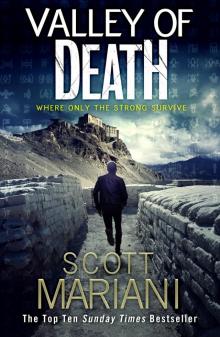 Valley of Death
Valley of Death House of War
House of War The Pandemic Plot
The Pandemic Plot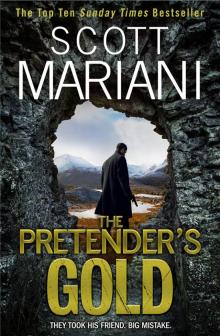 The Pretender's Gold
The Pretender's Gold The Demon Club
The Demon Club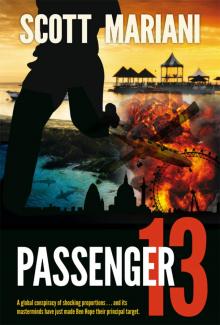 Passenger 13 (Ben Hope eBook originals)
Passenger 13 (Ben Hope eBook originals)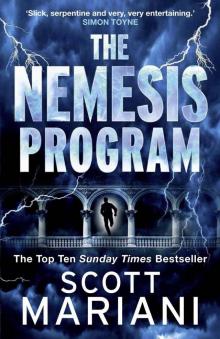 The Nemesis Program_Ben Hope
The Nemesis Program_Ben Hope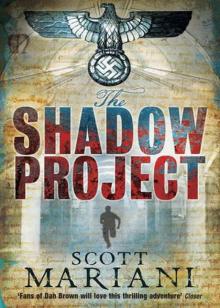 The Shadow Project
The Shadow Project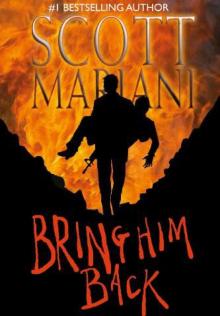 Bring Him Back
Bring Him Back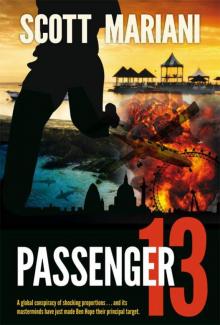 Passenger 13
Passenger 13 Sacred Sword (Ben Hope 7)
Sacred Sword (Ben Hope 7) The Sacred Sword (Ben Hope 7)
The Sacred Sword (Ben Hope 7) Sacred Sword
Sacred Sword The Babylon Idol
The Babylon Idol The Armada Legacy
The Armada Legacy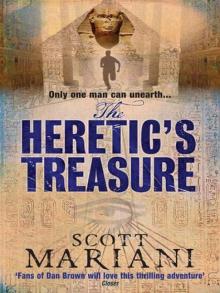 The Heretic's Treasure
The Heretic's Treasure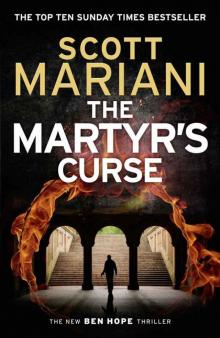 The Martyr’s Curse
The Martyr’s Curse DECOY (Kindle Single)
DECOY (Kindle Single) The Bach Manuscript
The Bach Manuscript The Alchemist's Secret
The Alchemist's Secret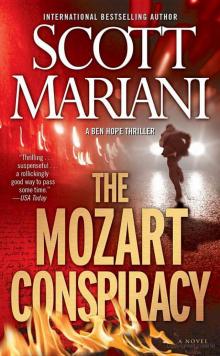 The Mozart Conspiracy: A Novel bh-2
The Mozart Conspiracy: A Novel bh-2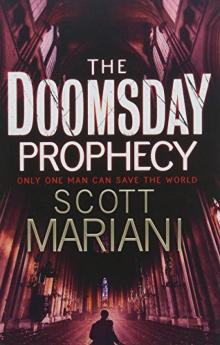 The Doomsday Prophecy
The Doomsday Prophecy The Ben Hope Collection: 6 BOOK SET
The Ben Hope Collection: 6 BOOK SET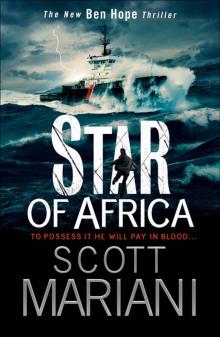 Star of Africa (Ben Hope, Book 13)
Star of Africa (Ben Hope, Book 13)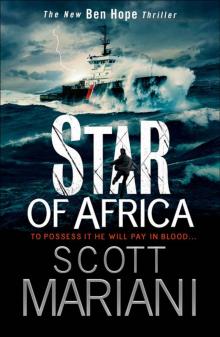 Star of Africa
Star of Africa The Forgotten Holocaust (Ben Hope, Book 10)
The Forgotten Holocaust (Ben Hope, Book 10) The Devil's Kingdom
The Devil's Kingdom The Lost Relic
The Lost Relic The Armada Legacy bh-8
The Armada Legacy bh-8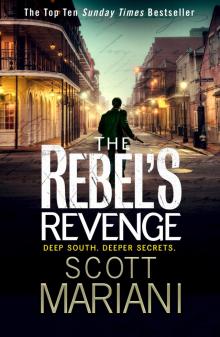 The Rebel's Revenge
The Rebel's Revenge The Forgotten Holocaust
The Forgotten Holocaust The Lost Relic bh-6
The Lost Relic bh-6 Ben Hope 05 - The Shadow Project
Ben Hope 05 - The Shadow Project The Mozart Conspiracy
The Mozart Conspiracy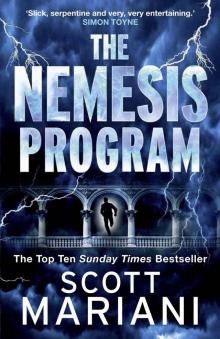 The Nemesis Program
The Nemesis Program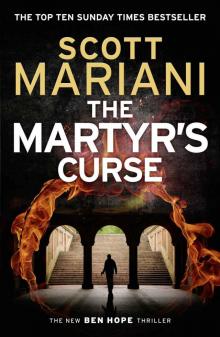 The Martyr’s Curse (Ben Hope, Book 11)
The Martyr’s Curse (Ben Hope, Book 11) THE TUNNEL: A Ben Hope Story
THE TUNNEL: A Ben Hope Story The Sacred Sword bh-7
The Sacred Sword bh-7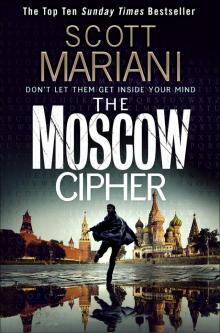 The Moscow Cipher
The Moscow Cipher The Shadow Project bh-5
The Shadow Project bh-5 The Tunnel
The Tunnel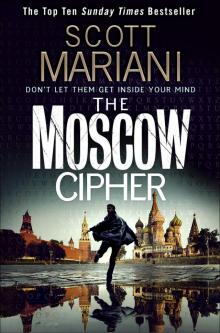 The Moscow Cipher (Ben Hope, Book 17)
The Moscow Cipher (Ben Hope, Book 17)